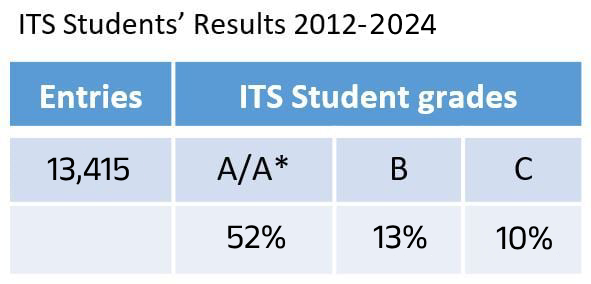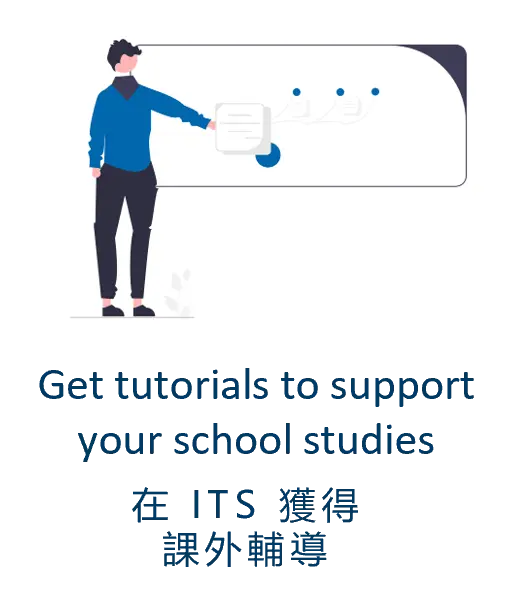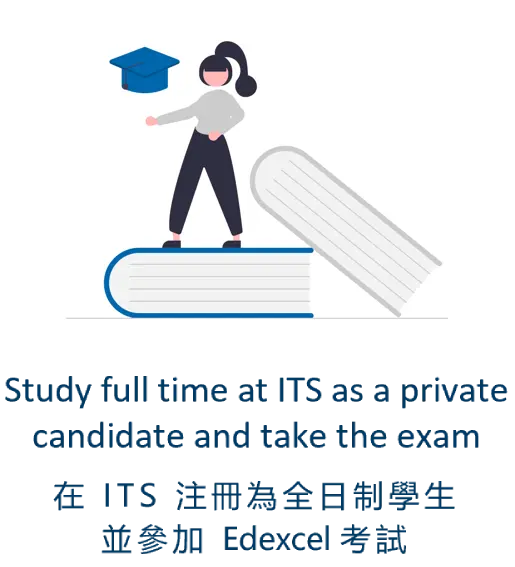* Terms and Conditions apply.




ITS Tutorial School has offered top A-level English language support since 2005. We are the only tutorial school in Hong Kong also licensed to run the A-level exams by Pearson. You can take both International A-levels and some GCE subjects as well. Thousands of students have taken private tuition with our Chinese tutors to date. You can either:






Choose another A-level subject:
accounting biology business chemistry chinese economics english language english literature geography history mathematics physics psychology spanish

Mandarin Chinese is spoken by nearly one third of the world’s population and has become increasingly important as a language of global business.
As a result, a proficiency in this language could help you stand out in tomorrow’s jobs market, giving you a competitive edge.
By studying Chinese you will also become familiar with the culture of China, which is an historic and diverse world superpower.
Please note: this course is mainly designed for native speakers.
The ability to speak a second language, even if only to A-Level, has huge advantages in the job market. You’ll find that you can use your Chinese language skills in many unrelated fields. However, if you’re looking to actively use the language in your career, then here are some professions that may be of interest:
There are no prerequisites, but an I/ GCSE qualification in English Literature would be helpful
For more information on specific university requirements related to A-levels, please see our A-levels FAQ page.
For more information on applying to UK universities, see our UCAS page.
If you are an international student taking A-levels the basic offer is made for 3 A-level subjects. It is very important when choosing these subjects that you understand what options you will have for university when the time comes. ITS has a long-established, highly experienced counselling team who can help you make these decisions and plan your academic course. But to start with, try out this excellent tool from the Russel Group which helps you experiment with your subject choices. Then come and see us.
You can find the Edexcel course specification here.
The course consists of 4 Units – 2 IAS and 2 IA2 Units. Students must take all 4 units to obtain the International Advanced Level History qualification. The percentage of total IAL marks for each Unit is in brackets followed by the length of each examination.
Paper 1: Listening, reading and translation (**Paper code: 9CN0/01)
Written examination: 2 hours
40% of the qualification
Content overview
This paper draws on vocabulary and structures across all four themes listed on pages 9-10. Themes
are based on the society and culture of Chinese-speaking countries.
Assessment overview
Students are not permitted access to a dictionary during the examination.
The examination is made up of:
Section A: Listening (30 marks)
A listening assessment based on a recording, featuring male and female Chinese speakers. Students
will respond to comprehension questions based on a variety of contexts and sources.
Recordings of spoken Chinese will be available in Mandarin and Cantonese.
The listening audio files for the sample assessment materials are available on our website.
Section B: Reading (30 marks)
A reading assessment based on a variety of text types and genres where students will respond to
comprehension questions.
Section C: Translation into English (20 marks)
An unseen passage to be translated from Chinese to English.
Paper 2: Written response to works and translation (**Paper code: 9CN0/02)
Written examination: 2 hours and 40 minutes
30% of the qualification
Content overview
This paper requires students to translate a previously unseen passage from English into Chinese.
This paper also draws on the study of two discrete Chinese works: either two literary texts, or one literary text and one film. The works must be taken from the list provided in Appendix 2: Prescribed literary texts and films. The literary texts listed include novels and short stories. All of the films are feature length.
Assessment overview
This paper includes a translation exercise and two extended responses to either two literary texts,
or one literary text and one film (students must not answer questions on two films).
Students are not permitted access to a dictionary or any documentation relating to the works during the examination.
Section A: Translation (20 marks)
Students translate an unseen passage from English into Chinese.
Section B: Written response to works (literary texts) (50 marks)
Students must write an extended response on either one or two of the literary texts listed in
Appendix 2: Prescribed literary texts and films.
If a student answers questions on two literary texts then they do not complete Section C.
Section C: Written response to works (films) (50 marks)
Students who answer only one question on a literary text in Section B must write an extended
response on one of the films listed in Appendix 2: Prescribed literary texts and films.
Paper 3: Speaking (**Paper code: 9CN0/03M/03C) Internally conducted and externally assessed Total assessment time: between 21 and 23 minutes, which includes a single period of 5 minutes’ formal preparation time 30% of the qualification
Content overview
Task 1 draws on vocabulary and structures across all four themes (listed on pages 9-10). Task 2 is
based on independent research selected and carried out by the student. The research may be based on
one of the themes or on the student’s own subject of interest related to the society and culture of
the Chinese-speaking world.
Students will be assessed on their ability to use a range of language accurately, communicate and interact effectively, summarise and analyse findings from written sources relating to their research subject, and show knowledge and understanding about the society and culture of the Chinese-speaking world.
Assessment overview
Students complete two tasks. Task 1 is worth 30 marks and Task 2 is worth 42 marks.
Task 1 (discussion on a Theme)
Students discuss one Theme from the specification based on a stimulus containing a short
statement.
Task 2, Part 1 (independent research presentation)
Students present a summary of at least two of the written sources they have used for their research
and give a personal response to what they have read.
Task 2, Part 2 (discussion on independent research)
Students answer questions on their presentation and then have a wider discussion on their research.
The assessment will be available in Mandarin and Cantonese. The option chosen for each student is
indicated by entry code:
Mandarin – 9CN0/03M
Cantonese – 9CN0/03C
Assessment
Available in June